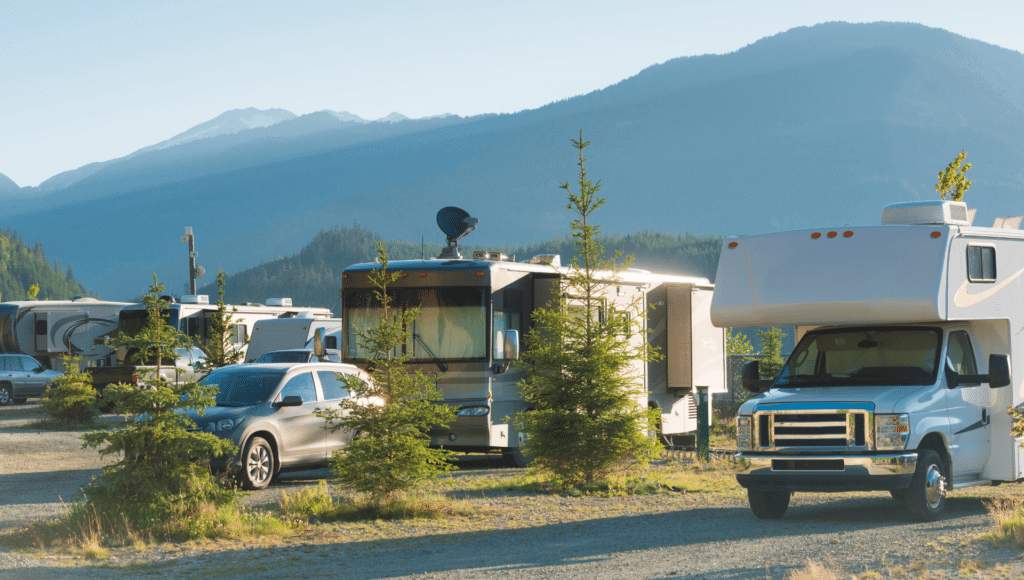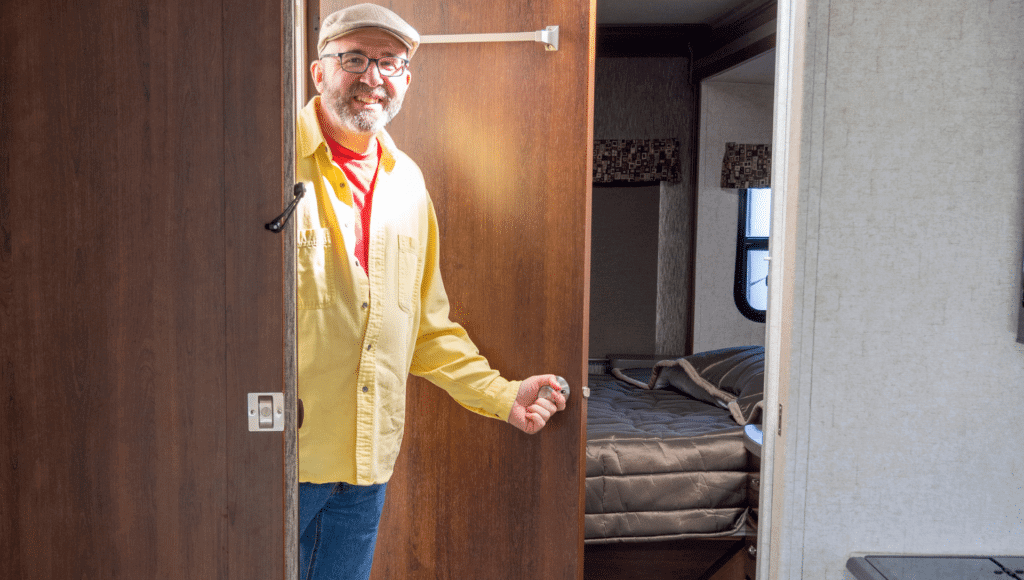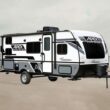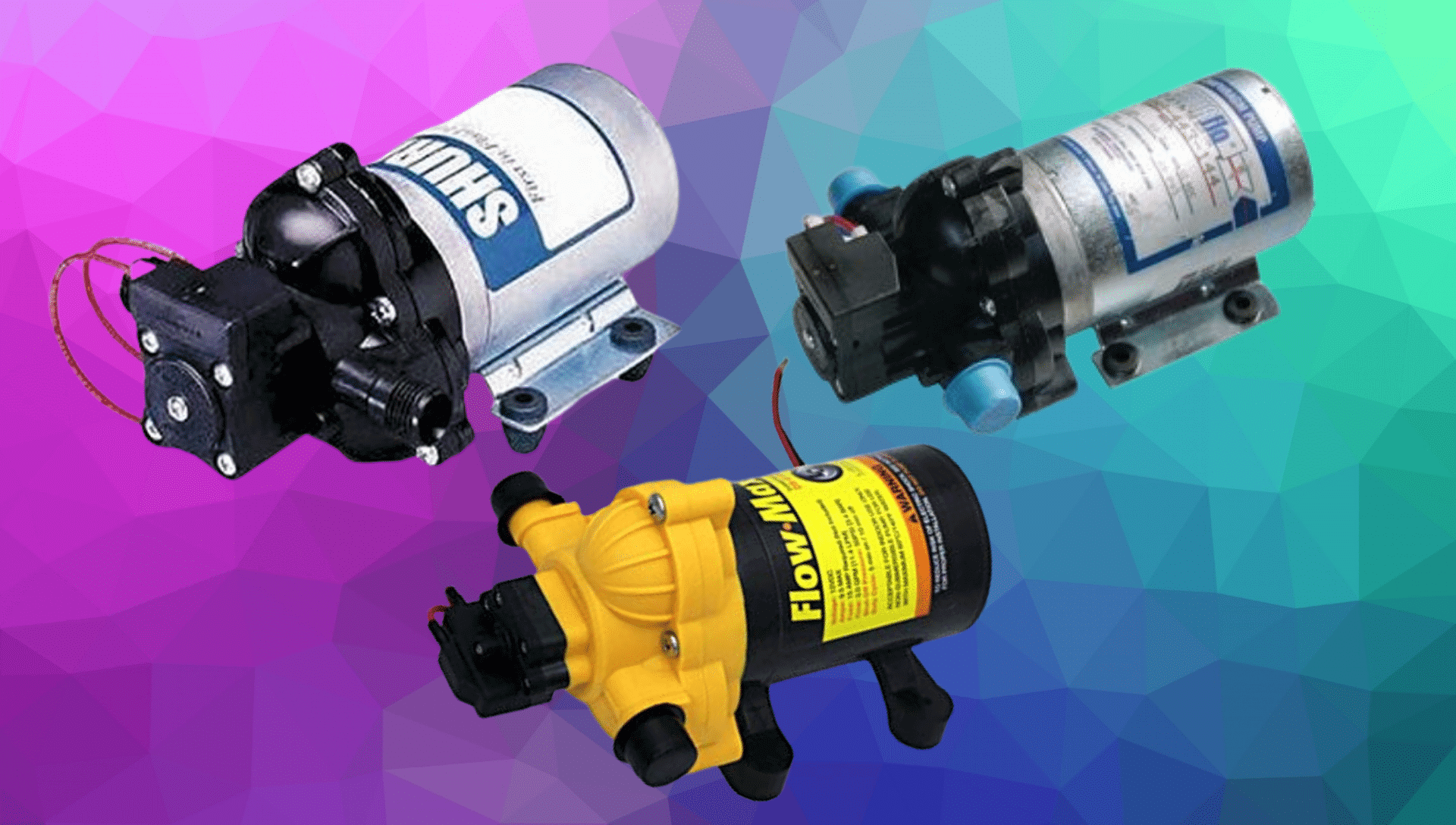Table of Contents Show
When you are chasing the dream of RV ownership, there are several things to contemplate before narrowing down your options. Life on the road can look ideal in those social media images we peruse. It can quickly detour onto bumpy pavement if you don’t take the time to find the perfect RV for your daily life and camping style. So if you are thinking about buying an RV for the first time, ponder the following items before putting cold, hard cash down on your escape vehicle.
Major Considerations When Buying an RV for the First Time
Type of RV
Have you thought about which type of RV would be best suited for your travels? There are three basic types of motorized recreational vehicles:
- Class A – these are usually large, bus-like vehicles with flat noses. They can sleep from 2 to 8 people and have either a diesel or gas engine.
- Class B – these RVs are considered vans but have all of the amenities of larger campers, including beds, baths, kitchens, and living spaces. They sleep 1 to 2 people and can be purchased with diesel or gas engines.
- Class C – these vehicles are easily recognizable, with beds over the cabs, and are built on a truck chassis. They usually sleep 2 to 6 people, depending upon the model. They typically have a gas engine, although a few models offer a diesel option.
The other type of RV is a towable one, pulled behind a truck or larger SUV. There are three categories of towables, including:
- Travel Trailer – these RVs are straight trailers that can range from 14 to 32 feet in length. They can sleep 2 to 6 people.
- 5th Wheel – these trailers have a bed on the front end with a hitch underneath it. The hitch attaches in the bed of the truck towing it, not on the bumper. 5th wheels can be as long as 44’ and sleep 2 to 8, depending upon the model.
- Pop-Up Trailer – usually, these towables are part metal/fiberglass and part canvas. This makes them unsuitable as 4 season campers but an excellent option for weekend camping. Their towable length is usually 12’ to 14’ long. The beds fold out over the ends, extending the sleeping space to accommodate 2 to 4 people.

Price
An RV cost can range from $10,000 to $500,000 and beyond, depending on the type of RV, its age, and the many amenities that can be added. Narrow down your choices by knowing what you can afford. This will also help you narrow down the type of RV you will get when buying an RV for the first time. Pop-up campers and Class Cs being the least expensive if purchasing new.
Use
Do you dream of parking your new RV at a campsite for a couple of weeks and exploring the surrounding area with your tow vehicle or a car you pull behind your camper? If so, a 5th wheel or large Class A may be the best choice. Or do you like to keep moving, visiting new destinations every couple of days? A Class B van may be the way to go if you don’t need a lot of daily living space. Are you more interested in traveling off-road? Many RVs have all-wheel drive, and some big 5th wheels and travel trailers have garages built into them for bringing along big “toys.”
Floor Plans
There is such a large variety of floor plans that you can find virtually anything you want. Whittle down your needs by what is important to you. Kitchen space? Outdoor kitchen? Dry bath? Wet bath? Garage space? 2nd bathroom? King-sized bed? Bunk beds for the kids? Island bed? Living space with theater seating? Dining room table? Look at all of the options to see what fits your lifestyle and needs when buying an RV for the first time. There are some things that you need to think about before deciding on a floor plan.
Storage
What will you be bringing along? If you plan on living in an RV, you will most likely need more storage than someone who only camps on weekends. Those who will use the RV for one vacation each summer may need even less storage space. If you require a large amount of space, start by looking at Class As. They usually have a “basement” that allows you to carry everything from bicycles and grills to extra tents, tools, and more. If your mantra is “less is more,” then explore Class B vans. They have very little exterior storage space, but a bit more indoor for clothing and a few essentials.
New vs. Used
Many new RVers feel more comfortable purchasing a new RV because of the warranties they come with. But more frugal shoppers may opt for buying a slightly used camper, knowing that they aren’t paying top dollar, just to lose some of the value through the first year’s depreciation. Still, like older RVs, others allow them to put their stamp on the vehicle by remodeling while saving a lot of money on the purchase price.
Search RV Websites
To discover all of the options listed above, start your search online by scrolling through RV listings on sale websites like RVTrader.com and RVT.com. Then look at dealership websites. You will find a wide variety of models and floor plans without ever leaving your home. This can help tremendously in the initial planning stages to quickly see what you like and don’t like about RV types, models, floor plans, and amenities when buying an RV for the first time.

Research Brands
Once you have narrowed down the type of RV that interests you most, do your background research on the manufacturers of those types. Look for information on the quality of their products and reviews by those who own them. The easiest way to find out if RV manufacturers have a good reputation is to type the name of the model you like into Google, followed by the word “reviews.”
Attend An RV Show
October, January and February are the three busiest months for RV shows around the country. Plan accordingly and find a show or two near you that will allow you to tour each model in person. There is nothing like sitting at the dining table or lying on the bed of your favorite recreational vehicle to see exactly how much or how little space you will have and how convenient the floor plan can be.
Network With Other RV Owners
Again, the internet can be a handy place to learn more about the industry, manufacturers, and models by joining RV brand specific forums and social media groups. You will be surprised by just how much campers will share about the pluses and minuses of their RVs. Most love fielding questions from those who are considering the RV lifestyle and buying an RV for the first time.
Determine Your Must-Have Accessories
Become a specialist for the brand(s) you like by collecting pamphlets on different models. They usually highlight many of the optional amenities you can have added to your rig. From outdoor TVs to central vacuums, granite countertops, to solar panels, there are endless opportunities to make your new RV your own specially designed home away from home!
Negotiate Your Price When Buying an RV for the First Time
If you choose to purchase a new RV, don’t ever assume that the sticker price is the final price. It is not unusual to find most dealerships may consider taking anywhere from 15% to 40% off the MSRP. So negotiation can be your bank account’s best friend. Do your homework before you decide to buy. Check with several dealerships that carry the same model that you want to purchase and compare prices. Find out what others are routinely paying for that particular RV by joining model-specific Facebook groups. And talk with other owners about the ins and outs of negotiating.
If purchasing a used RV from a private party or dealership, don’t throw your negotiating skills out the door either. Many times you will find better prices on quality vehicles from private owners. You may also discover that they have all the repair and maintenance records. They can tell you about any idiosyncrasies the RV may have. Private owners may give you an idea if they are open to a lower price, or they may stand their ground, demanding that the price is firm. On the other hand, a dealer doesn’t have that first-hand knowledge about the vehicle, but they do have the RV on their lot to make money. Only you and your negotiating self can determine how much or how little they might make off you!
Buy At The Right Time When Buying an RV for the First Time
As with cars, there are seasons when purchasing an RV makes more sense than at other times. For instance, many dealers are left with the inventory at the end of the summer season because prospective customers do not think of camping in the upcoming winter. Deals may be had when the stock is high.
However, prices may be higher at the start of regular camping season in late spring or when inventory is low. An excellent example of this occurred with the recent influx of RV purchases during the covid outbreak. New owners recognize the benefits of having a self-contained recreational vehicle in which to travel. Prices on existing inventory skyrocketed because they were in great demand.

Mistakes to Avoid When Buying an RV for the First Time
Buying an RV That Does Not Meet Your Specific Needs
If you purchase an RV without considering the items listed above, you may end up owning a vehicle that doesn’t suit your lifestyle, camping style, or traveling style. That doesn’t make for a “happy camper.” Don’t settle, either, for an RV just because it might be sold if you wait too long or because of a passing fancy on a specific model. Take the time to do your research. The right RV will be there waiting for you when you are ready to buy it with open eyes and a good plan.
Not Getting a Used RV Inspected
Numerous RV owners have littered the roads with broken-down vehicles because they didn’t take the time or money to hire an RV inspector before purchase. Don’t make the same mistake. Inspectors are specially trained to sniff out problems, big and small, and call them to your attention. They can often give you an idea about more significant issues that may arise or mitigation that you can do to avoid the problems if you still choose to buy the vehicle. Think of an RV inspector as someone who offers peace of mind, as well as expertise for your important purchase.
RV Towing Vehicle That Does Not Meet Tow Specifications
If you have decided that a towable RV is the right vehicle for you, don’t skimp on the truck that will be pulling your trailer. Make sure it has a large enough engine to handle your new 5th wheel or travel trailer’s size and weight. Otherwise, you might not be going very far, and that truck may spend a good deal of time in the shop for repairs.
Not Having an RV Dealer Walkthrough of All RV Systems
You will spend dozens and dozens of hours learning your RV systems the hard way if you don’t demand that your dealer give you a detailed walkthrough before you drive off the lot. And if the salesman offers to do the walkthrough, make sure he knows what he or she is talking about; otherwise, demand that a tech or service person knowledgeable about your RV gives you a thorough tour. It is always a great idea to video your walkthrough and give you a reference to review anytime you need assistance with a system. Our Preparing to RV Bundle printable has a comprehensive PDI (Pre-Delivery Inspection) checklist which is great when buying an RV for the first time.

Not Knowing Your RV’s Height Limitations
This item can literally tear your RV apart, as witnessed by RV owners who tried to “sneak under” low clearance bridges or gas station awnings. Utilize RV trip-planning software, GPS units, and truckers’ maps to find and avoid low clearances. Know your vehicle’s exact height and width, or you might find yourself stuck between a rock and a hard place.
Purchasing the Incorrect Insurance and Roadside Assistance
When selecting roadside assistance plans, be sure you buy a level of coverage that will include all of your vehicle(s) needs, like the dolly or trailer you pull your car on behind the RV. And be specific on your requirements when setting up insurance coverage. There is nothing worse than needing to use your insurance policy, then finding out that it didn’t cover specific criteria. The cost of repairing or replacing uncovered items will have to come out of your pocket.
Rent Before You Buy
If, after looking at all the considerations listed above, you still can’t narrow down your choices in recreational vehicles, try renting a particular model and floor plan and take it out for a spin! Weekend camping trips can give you great insight into your own needs in a vehicle. Companies like Outdoorsy and RV Share allow you to rent from private owners before you buy your camper. You will get an in-depth tour and proper instruction on how to use the systems in the RV straight from the owner before you hit the road. You’ll have the opportunity to try it out in various destinations of your choosing. It’s one of the best ways to try before you buy when buying an RV for the first time.
Dealers Might Include Fun Extras If You Ask When Buying an RV for the First Time
Many times dealerships will offer add-ons to seal the deal and get you to sign on the dotted line. And if they don’t, you can always ask. Here are just a few upgrades that may entice you to complete a purchase:
- Bug screens for outdoor vents
- Roof vent covers
- Hitch assembly
- Campground memberships
Don’t hesitate to ask for anything else you might like added; you never know what you might get! We hope these tips will help you find the perfect RV. Happy shopping when you are buying an RV for the first time!







Hey guys,
First time buyer here!! You article sure did help me out, thanks so much. I have settled upon a travel trailer and actually found the exact layout that suits me best. I am going to be fulltime, excited to live in cooler climates due to a disease that makes living in excessive heat, nearly unbearable. The unit I found is a “4 season” and was very comfortable in the sweltering 98° when I stepped into it. I do have a odd question though…should I buy the RV first or the truck first? Yes, I I have to face that leap as well. I realize that it’s kind of “which came first, the chicken or the egg” and without one, I don’t need the other but, I don’t know anyone else to ask. I found the unit I like as well as the truck I will need…I just don’t know which to finance first (as far as the credit goes). I have a good credit rating and the unit I like is $33,500, the truck is $42,000…will the banks that will be financing realize what I am trying to do? I will be alone in my endeavors and will be traveling the country alone…I understand that it is best not to tell anyone having to do with the purchases or getting it insured that my plans are to be a fulltime camper? Speaking of insurance, is it really expensive to insure a travel trailer? I do hope that you guys might be able to help me in answering this question and will be looking forward towards hearing back from you.
Sincerely,
Amy